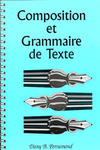We don’t actively support Internet Explorer
It appears that you are using Internet Explorer, which has been discontinued by Microsoft. Support has ended for versions older than 11, and as a result you may face security issues and other problems when using it.
We recommend upgrading to a newer browser such as Firefox, Google Chrome, or Edge for a much better experience across the web.
While this site may work with Explorer, we are not testing and verifying it, so you may run into some trouble or strange looking things.
The French They Never Taught You, Second Edition
Tips for Teachers and Advanced Students
By J.J. Biname, P.G. Socken
Overview
Grammar is not a four-letter word. Learning vocabulary is not a form of punishment. They are the basis of any language, and a student who wants more than a tourist's booklet of useful phrases will need to learn them sooner or later. The second edition of this popular little book takes the sting out of the exercise and even makes it a pleasant experience. By tackling issues not addressed in other texts or by doing so in a new way, we examine questions you will find novel and intriguing.
In the section on grammar, we propose a new and better way to tell the use of the passé simple or passé composé and the imparfait. There really are differences in causal conjunctions (parce que/car/comme/puisque). The agreement of the past participle of pronominal verbs (Elle s'est coupée au doigt) is also explained clearly. The updated section on vocabulary helps you distinguish between pouvoir and puissance (power), and the section on style deals with such issues as letter-writing and levels of language.
The purpose of this work, like that of second-language teachers, is to inspire students to seek what is unique in both languages and to reflect on the relationship and interplay between them.
Table of Contents
Part One: Grammar1. PrepositionsFor – expressing timeTo + infinitive2. Adverbial PhrasesAdverbial phrases of place3. PronounsDon’t or duquel?On…vous4. VerbsAgreement of the past participle of pronominal verbsPlus-que-parfait or passé antérieur (passé surcomposé)?Je l’ai vue les volerThe passive versus the active voiceImparfait, passé simple and passé compose: the traditional approachPassé simple (passé compose) / imparfait: a new approachSome basic points about sentence structureFuture anterior of conjecture, conditional of unconfirmed informationPresent participle and gerundive5. ConjunctionsCausal conjunctions6. AdjectivesThe position of the adjective (Part I)The position of the adjective (Part II)7. ArticlesParts of the bodyFrançais / le français8. AdverbsNegativesPosition of adverbs9. MiscellaneousIt is, he is (Part I)It is (Part II)You can seeGenderNegatives and positives: inversionGuaranteePart Two: Vocabulary1. Test2. Être en accord or Être d’accord?3. Relatives 4. Holiday, Vacation5. Décider6. Pouvoir and Puissance (Power)7. To Suggest8. To Visit9. Se servir de10. Scarcely, Hardly11. Could, Would12. Oui or Si?13. D’avance / À l’avance14. Mener/ Porter15. Sans doute and Other False Friends16.S’assurer que17. Food…for Thought18. Tranché19. Each / Every20. Encore and Toujours21. When is a Rue Not a Street22. Espoir / Espérance23. Numbers, Figures and Digits24. There Are Words…And There Are Words: Mots / Paroles25. So26. Diminutives27. Bouchées, Fournées, Soirées…Chaque jour et Chaque année: Reflections on a Suffix28. An Employee Isn’t un employéConclusion



